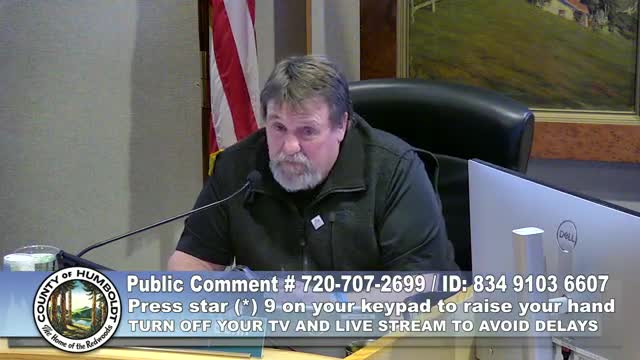Board clears path to review zoning and code changes to allow Trinidad’s Yeehaw community to seek permits
Get AI-powered insights, summaries, and transcripts
Subscribe
Summary
The Humboldt County Board of Supervisors voted 5-0 to accept a modified general-plan amendment and start processing a zoning change and conditional-use review that would allow the Yeehaw intentional community near Trinidad to pursue emergency housing permits under revised rules.
The Humboldt County Board of Supervisors voted unanimously to accept a modified petition and begin processing a general-plan amendment and zoning changes that would allow the Yeehaw intentional community near Trinidad to pursue permits under the county’s emergency housing rules.
Planning staff recommended changing the parcel’s land-use designation to match surrounding residential-estate (RE) designations and amending the recently adopted emergency-housing / temporary-village rules so that emergency housing villages can be conditionally permitted on some agricultural-general parcels inside community planning areas. Planning Director John Ford said the approach keeps the county’s policy goals intact while creating a pathway for the property owner and community to try to resolve long-running health and code violations.
The board’s action directs the applicant to submit a complete application for the general-plan and zoning amendments by March 7, 2025, and a complete conditional-use permit application by May 7, 2025. Staff recommended returning the proposed code changes and environmental review to the board on Aug. 5 and sending any use-permit materials to the Planning Commission for action on Sept. 18, 2025.
Why it matters: The property has been the subject of multiple code-enforcement inspections for unpermitted dwellings, wastewater and water-supply questions, and accumulated waste. Planning and Environmental Health staff described a three-part compliance challenge: (1) building-code review and as-built permitting for nonstandard structures; (2) proving adequate, long-term water quantity and quality; and (3) designing on-site wastewater treatment or other sanitary solutions following county and state rules. Environmental Health Director Mario Carlson told the board the county will require site evaluations and soil testing—often called wet-weather testing—to determine where septic systems can be safely sited and how many units the property can support.
Staff recommended code changes rather than approving the applicant’s original request to replan the parcel to medium-density residential. Senior planner Steve Lazar told supervisors, “we don't believe it's appropriate to approve the petition as it's been proposed,” because medium-density residential normally requires locations served by public water and sewer. Instead staff proposed to (a) change the parcel to match adjacent RE land uses and (b) amend the emergency-housing rules to allow conditional use of emergency-village formats on ag-general parcels of five acres or less within community planning areas, and to allow discretionary waivers related to access-road classification when safety reviews support them.
Public comment was split but included multiple residents and current Yeehaw participants urging the board to allow the community to stabilize and pursue permitting. Applicant Charles Garth and supporters described recent cleanup efforts—removal of unpermitted privies, placement of temporary toilets and hand-washing stations, and water testing—and said they were prepared to deposit required application fees and work with county staff to complete required studies. Planning staff cautioned that full compliance could require engineering and testing costs that may exceed $100,000 depending on site constraints.
Board action and next steps: Supervisor Matt Madrone made the motion to accept staff recommendations as presented; Supervisor Mike Wilson seconded. The board also required the applicant to post the normal deposits to start formal review and to cover past staff costs associated with code enforcement on the property. The motion passed 5-0.
The board’s acceptance starts a formal public review. The county emphasized that amending the ordinance would not by itself permit any use — any eventual emergency-village or alternative-lodging permit would still require environmental review, a conditional-use hearing and specific public-health and building approvals before any additional residents could lawfully remain on the site.
Ending note: Staff flagged an early technical deadline: on-site wet-weather testing for wastewater siting must be completed on the usual seasonal schedule (wet season), and Environmental Health said the capacity analysis depends on those tests. The board asked staff to return with the code amendments and a firm schedule for environmental review tied to the applicant’s submittal dates.
